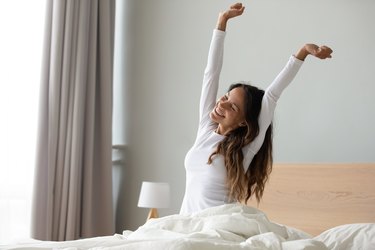
Raise your hand if this sounds familiar: You wake up worn out, then feel generally exhausted all day long only to find your head spinning with unrestful thoughts when you sink into bed.
"Poor sleep has been around for a long time," Marishka K. Brown, PhD, director of the National Center on Sleep Disorder Research, tells LIVESTRONG.com.
Video of the Day
Video of the Day
And it's not a trivial matter: Sleep is essential for overall physical and mental health and wellbeing, Brown says.
Simply put: "If you don't sleep, you don't feel good," she says.
That's because sleep — along with nutrition and exercise — is a pillar of health, says Abhinav Singh, MD, facility director of the Indiana Sleep Center and member of the National Sleep Foundation medical advisory board.
"If you don't have good sleep habits, you're generally not going to eat well nor will you have the energy or motivation to exercise," he adds.
Sleep may sometimes feel negotiable — we sacrifice hours in bed for completing work projects or having downtime when the kids are in bed. And even though we've been bombarded with info about the harmful effect blue light can have on our sleep, we may still snuggle with our phones as we drift off or watch TV in the late evening.
But improving the quality of your sleep will make a big difference when it comes to your overall health and quality of life.
"Like with any behavior change or improvement, there has to be motivation and a plan toward it," Dr. Singh says.
Enter this seven-day kickstart plan. Each day, you'll add a new habit. There's no need to do everything all at once. Over the course of the next week, you'll make small adjustments — from changing your dinnertime to journaling in the evening — that'll help you get on the path to better sleep.
Day 1: Perfect Your Wind-Down Routine
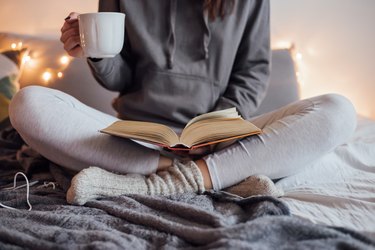
You can't fall asleep in a snap of the fingers. Instead, you'll need a wind-down routine. Dr. Singh compares it to going on a flight: Your plane may take off at 10 p.m., but you'll need to arrive at the airport well over an hour prior to takeoff so you can go through security, check your bags and so on.
He recommends a four-stage relaxation process:
- Take a warm shower or bath: About an hour before bedtime, hop in the tub for a warm shower or bath — this will warm up your skin and cool down your core body temperature, which promotes the release of melatonin, Dr. Singh says. Not only does taking a warm shower or bath help you fall asleep faster, but it also improves sleep quality, per a review of more than 5,000 studies in the August 2019 issue of Sleep Medicine Reviews.
- Journal: Take about 15 minutes to write out your thoughts, worries or even your to-do list items for the following day, Dr. Singh says. That way, everything "falls out of your head onto the piece of paper," he says — that's advantageous, because it means you can avoid a swirl of thoughts boomeranging in your brain later when you're trying to fall asleep.
- Read a book: Reading is a relaxing activity. A paper book is ideal here, Dr. Singh says, but ebooks are fine so long as you can avoid a lit-up screen.
- Meditate: Lastly, Dr. Singh recommends doing a calming meditation or mindfulness exercise. These kinds of activities reduce stress and anxiety, per Harvard Health Publishing. There are plenty of free meditation apps available to get you started.
Collectively, these steps will leave you feeling relaxed and help prep your brain for bedtime. No need to overhaul the pre-bedtime hour in a flash. Try adding a habit a day until you've got all four in place.
Day 2: Optimize Your Bedroom
Review your sleep environment to make sure you're meeting these standards:
- Temperature: About two hours before your bedtime, start cooling down your home, Dr. Singh recommends. Aim for between 60 and 67° F, per the National Sleep Foundation.
- Sounds: Use earplugs, run a fan or use a white noise machine (or white noise app) to cover up loud sounds, like your partner's snoring or car horns outside.
- Light: Black-out shades will prevent light from sneaking in through the window.
Day 3: Put Down Your Phone
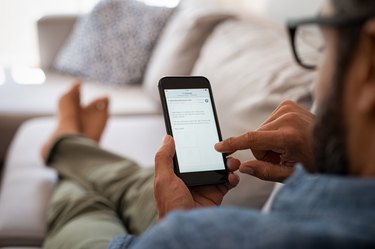
You're probably well aware of the issues that arise due to the blue light emitting from electronic devices (that is, your phone, the TV and so on). This type of light messes with your synthesis of melatonin (aka the hormone that regulates your sleep-wake cycle, according to the National Sleep Foundation), which in turn interferes with sleep, Dr. Brown says.
"At least two hours before you climb into bed, you should think about putting any sort of screen-related stimulation away," Dr. Singh says.
Not only is the light an issue, but engaging with social media, skimming news stories and other phone activities will rev up your brain.
This is likely a big shift in habits, so take it slow: Cut off your screen time 15 minutes earlier than usual, then inch to an even earlier screen curfew.
Tip
Try moving your phone charger to a room you won’t visit close to bedtime (say, the kitchen). Plug in your phone in the evening before you commence your wind-down routine. That way, you won’t be tempted to engage with it.
Day 4: Pay Attention to What You Eat and Drink — and When
Eating too close to bedtime interferes with sleep, per the Mayo Clinic. If your bedtime is 10 o'clock, cut off foods that are dense with calories and carbohydrates around 6 or 7 p.m., Dr. Singh says. His guiding principle: "Eat with the sun, and sleep with the moon."
Pay attention to your fluid intake, too.
"Most people don't know it, but caffeine has a half-life of between six and eight hours," says sleep specialist Michael Breus, PhD, author of The Power of When. He recommends having your last caffeinated beverage of the day around 2 p.m. if you're shooting for a 10 p.m. bedtime.
And take it easy on alcohol. "It takes the average human one hour to digest one alcoholic beverage," Breus says. He suggests cutting off alcoholic beverages three hours before bedtime, and limiting yourself to two.
Alcohol initially has a sedative effect. But as your body metabolizes it, this wears off, preventing you from getting deep sleep, per the Cleveland Clinic. Other consequences of alcohol on your sleep include a higher chance of vivid dreams as well as an increased risk of sleep apnea, according to the Cleveland Clinic.
"Without exception, alcohol impacts sleep negatively," Dr. Singh notes.
Day 5: Get Bright Light Early in the Day
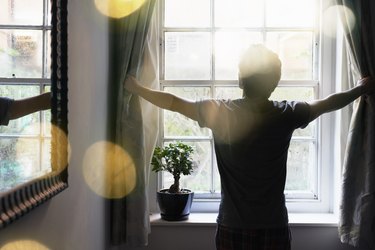
The path to solid shut-eye begins early in the day, when you should aim to soak up sunshine. This light helps keep the circadian clock — the master clock within our brain that regulates all sorts of behaviors in your body — in sync, sending your body a heads-up to be alert, awake and get going, Dr. Brown says.
"By getting direct sunlight for approximately 15 minutes, it'll turn off the melatonin faucet in your head and be helpful for getting rid of brain fog," Breus says.
Exposure to daylight helps people fall asleep earlier, increases how long people sleep and improves sleep quality, per an August 2019 review in Somnologie.
"As best as you can, get sunlight at the same time every day," Dr. Brown says. "Schedules are important." Ideally, you'll soak up direct sunlight within an hour of when you wake up, since that's one of the times when the circadian clock is most sensitive to light, according to the Centers for Disease Control and Prevention (CDC).
Day 6: Make Sure to Move
Getting some exercise is a biggie when it comes to improving your sleep quality, Breus says. "Remember, sleep is recovery. If you don't move, you don't have anything to recover from," he says.
For middle-aged and older adults, exercising increases sleep efficiency (that is, the ratio of time spent in bed sleeping compared to total time in bed) as well as sleep duration, per a March 2017 review of 29 studies in Advances in Preventive Medicine.
Aim to exercise daily, Brues says. "You don't have to run a marathon. Twenty minutes of cardio once a day, a couple of stretches, maybe some stretching before bed is going to be great," he says.
Try not to do a major workout too close to bedtime, he says — this will increase your core body temperature. Plus, a flood of exercise-induced endorphins isn't helpful for getting in a restful state.
Related Reading
Day 7: Get on a Schedule
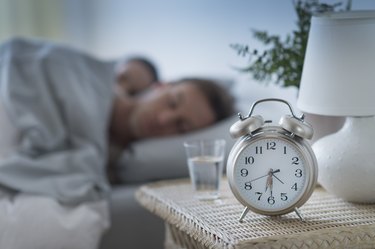
For better sleep, pick a single, consistent wake-up time — then stick to it, Breus says.
Recent research points to your genes influencing your ideal wake-up time for you. Using genome data from nearly 700,000 people, researchers were able to pinpoint hundreds of genetic factors that determine if you're a morning person, per a January 2019 article in Nature Communications.
But of course, that's not necessarily very practical: Genetic factors may dictate a preference toward being a night owl or morning person, but responsibilities — like making it to work on time — are probably the most decisive factor when it comes to setting your alarm.
Try setting a wake-up time you can stick with on both work days and days off. Count backward to determine when you should go to bed, keeping in mind that adults should get at least seven hours of sleep a night, per the Centers for Disease Control and Prevention.
- Sleep Medicine Reviews: "Before-bedtime passive body heating by warm shower or bath to improve sleep: A systematic review and meta-analysis"
- Harvard Health Publishing: "Regular meditation more beneficial than vacation"
- National Sleep Foundation: "The Ideal Temperature for Sleep"
- Mayo Clinic: "Will a bedtime snack help me sleep better?"
- National Sleep Foundation: "Melatonin and Sleep"
- Somnologie: "Effects of light on human circadian rhythms, sleep and mood"
- Advances in Preventative Medicine: "Interrelationship between Sleep and Exercise: A Systematic Review"
- Nature Communications: "Genome-wide association analyses of chronotype in 697,828 individuals provides insights into circadian rhythms"
- Centers for Disease Control and Prevention: "How Much Sleep Do I Need?"
- Cleveland Clinic: "Why You Should Limit Alcohol Before Bed for Better Sleep"
- Centers for Disease Control and Prevention: "Effects of Light on Circadian Rhythms"
Is this an emergency? If you are experiencing serious medical symptoms, please see the National Library of Medicine’s list of signs you need emergency medical attention or call 911.